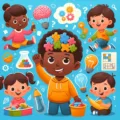Introduction
Counseling can be challenging, but incorporating fun activities and games can make it more engaging and rewarding for both the counselor and client. Maintaining a sense of playfulness and curiosity creates opportunities for deeper connection, insight, and growth.
Benefits of Using Games
Including games in counseling provides many benefits:
- Builds rapport and trust
- Encourages openness and sharing
- Distracts from painful emotions
- Teaches coping skills
- Creates moments of joy and levity
10 Fun Counseling Activities
1. Feelings Charades
Using index cards with different emotions written on them, have clients pick a card and act out the feeling through facial expressions and body language. The counselor tries to guess the feeling.
2. Thumball
A ball covered with discussion prompts to facilitate conversation on self-esteem, emotions, relationships, values, and more based on wherever client’s thumb lands.
3. Therapeutic Board Games
Games like Family Feelings teach coping skills and What’s Your Grief? explores reactions to loss.
4. Feeling Fortune Tellers
Colorful paper fortune tellers with feelings, coping strategies, and affirmations give clients something fun to play with while discussing emotional topics.
5. Storytelling With Miniatures
Miniature toys, buildings, and figurines prompt clients to craft stories, enabling projection, metaphor, and insight.
6. Self-Expression Through Art
Supplies like markers, colored pencils, modeling clay, and collage materials permit creative exploration of thoughts and feelings.
7. Therapeutic Card/Board Games
There are lots of therapeutic games like these available: The Ungame, Therapeutic Treasure Deck, and Table Topics.
8. Journaling
Writing, drawing, or collaging in a journal helps clients process emotions and track growth.
9. Sand Tray Therapy
Miniature objects selected and arranged in sand provide soothing tactile experience to foster self-reflection.
10. Music Therapy
Creating playlists, reacting to songs, and songwriting provides outlet to explore moods, memories, values, and social skills.
Wrapping Up
Adding playful activities makes counseling more rewarding for clients and clinicians by tapping into creativity, expression, connection. What games or creative interventions have you found helpful? Feel free to share in the comments!
FAQ
What are some quick and easy counseling games?
Some quick and easy counseling game ideas include feeling charades, journaling, therapeutic card games, art therapy prompts, and playing music.
How do you make counseling fun for teenagers?
Teen counseling can incorporate games like feeling fortune tellers, storytelling with miniatures, therapeutic board games, sand tray therapy, journaling, and music activities.
What can you legally and ethically do in counseling sessions?
Legally and ethically, counselors should act in clients’ best interests, respect privacy, establish appropriate boundaries, and design activities focused on therapeutic growth and healing.
Can I lead counseling sessions without training?
It’s legally and ethically advisable to have formal training and credentials like licensure or certification to lead counseling sessions.
What counseling approaches increase client engagement?
Using strengths-based, person-centered talk therapy supplemented by creative arts, games, mindfulness, music, and animal-assisted activities boosts counseling client engagement.

![10 Fun Counseling Activities, Exercises & Games [100% Free]](https://d3b41cb77k0chc.cloudfront.net/wp-content/uploads/2024/06/10-fun-counseling-activities-exercises-games-100-free-710x210.jpg)







